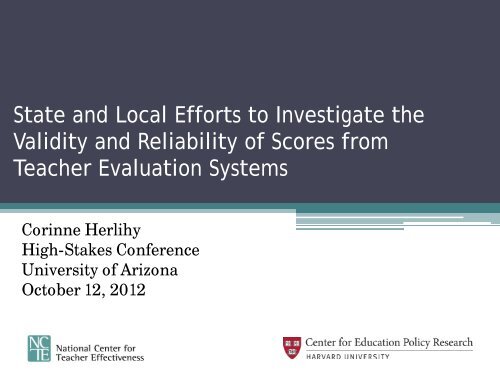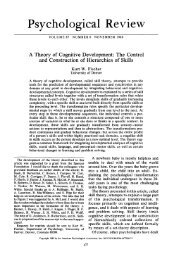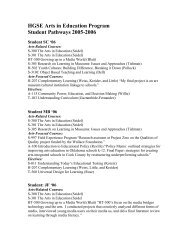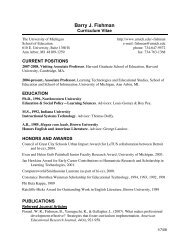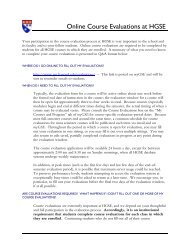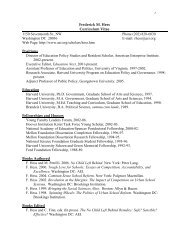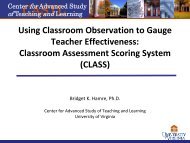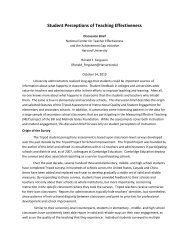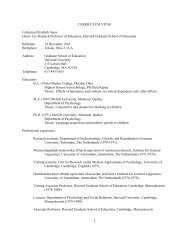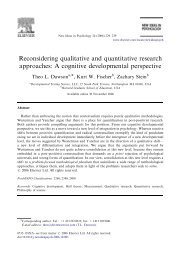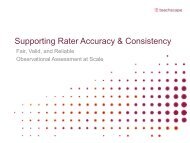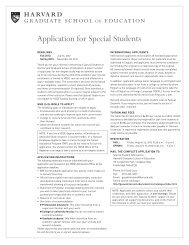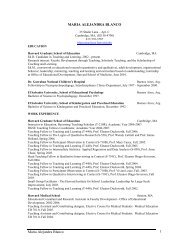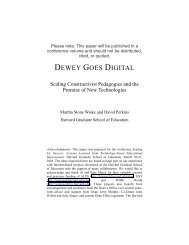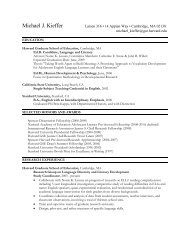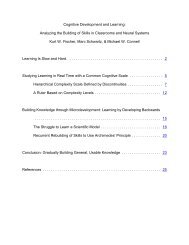Presentation slides - Harvard Graduate School of Education
Presentation slides - Harvard Graduate School of Education
Presentation slides - Harvard Graduate School of Education
You also want an ePaper? Increase the reach of your titles
YUMPU automatically turns print PDFs into web optimized ePapers that Google loves.
State and Local Efforts to Investigate the<br />
Validity and Reliability <strong>of</strong> Scores from<br />
Teacher Evaluation Systems<br />
Corinne Herlihy<br />
High-Stakes Conference<br />
University <strong>of</strong> Arizona<br />
October 12, 2012
Overview<br />
• Introduction and purpose<br />
• Sample and Methods<br />
• What do we mean by valid and reliable?<br />
• Findings<br />
▫ Reliable and Valid<br />
▫ Evaluators, Instruments and Sampling Lessons<br />
▫ Decisions, PD for Teachers, and Changes in <strong>School</strong><br />
Culture
Purpose<br />
• We examine states’ efforts to investigate and<br />
ensure the reliability and validity <strong>of</strong> scores<br />
emerging from new teacher evaluation systems<br />
• We focus on areas known to be <strong>of</strong> concern in the<br />
production <strong>of</strong> high-quality observational scores<br />
▫ The choice <strong>of</strong> the observational instrument<br />
▫ Rater training and certification<br />
▫ The number <strong>of</strong> lessons collected per teacher per<br />
year
Sample <strong>of</strong> 17 States<br />
• Each state received a RTTT grant or NCLB<br />
waiver before July 1, 2012;<br />
• Conducted a pilot-test <strong>of</strong> its new teacher<br />
evaluation system during or before the 2012-13<br />
school year;<br />
• Had statutory language describing a teacher<br />
evaluation system which satisfied the<br />
requirements <strong>of</strong> RTTT or NCLB waiver;<br />
• And did not have any pending legislation, as <strong>of</strong><br />
7/1/12, which would substantially change the<br />
system
Methods<br />
• Document collection and analyses to answer<br />
basic questions about state-level guidance<br />
▫ Legislation and government guidelines,<br />
▫ RTTT applications, and<br />
▫ NCLB flexibility requests, etc.<br />
• Led to creation <strong>of</strong> a 25-question interview<br />
protocol<br />
• Interviews with 13 state DOE staff from 12<br />
states, typically a director, coordinator or<br />
executive <strong>of</strong>ficer <strong>of</strong> the state’s efforts to<br />
implement new teacher evaluation system
What do we mean by reliable and valid?<br />
What do states mean for scores to be reliable and valid?<br />
What efforts are underway to ensure the reliability and validity<br />
<strong>of</strong> scores?<br />
What would you like to see in order to assure reliable and valid<br />
scores?
What do we mean by reliable and<br />
valid?<br />
• Score validity<br />
▫ Construct validity<br />
• Face validity<br />
• Factor analyses or other construct identification<br />
procedures<br />
• Criterion-related validity<br />
▫ Consequential validity<br />
• Both for the individuals in the system<br />
• And for the system itself – are there positive or<br />
negative unintended consequences?
What do states mean for scores to<br />
be reliable and valid?<br />
• 9 states responded<br />
• The most common answer (3 states) was to see<br />
congruence between observation and studentassessment-based<br />
metrics<br />
• Two answers focused on elements <strong>of</strong> the system<br />
that would improve validity and reliability<br />
▫ a distribution <strong>of</strong> scores that better reflects reality<br />
▫ raters who are more grounded in benchmarks and<br />
evidence<br />
• Some answers were very vague, only loosely<br />
related to standards for validity and reliability
What efforts are underway to ensure the<br />
validity and reliability <strong>of</strong> the scores?<br />
• 12 states responded<br />
• Responses varied widely across states<br />
• Taken together states are attending to many <strong>of</strong><br />
the issues involved in establishing reliability and<br />
validity <strong>of</strong> assessment systems<br />
• Rare to see a state attending to more than a<br />
handful <strong>of</strong> issues at a time, and some states are<br />
attending to only one
What efforts are underway to ensure the<br />
validity and reliability <strong>of</strong> the scores?<br />
• Enhanced training <strong>of</strong> evaluators to meet<br />
standards<br />
• Empirical investigations (finished or planned)<br />
▫ Correlate VAM and observation scores<br />
▫ Investigate inter-rater reliability<br />
▫ Factor analyses <strong>of</strong> data<br />
▫ Studies <strong>of</strong> validity and reliability studies<br />
• Auditing/monitoring techniques planned<br />
• Selection <strong>of</strong> instruments with evidence <strong>of</strong><br />
reliability and validity
What would you like to see in order to<br />
assure reliable and valid scores?<br />
• 8 states responded<br />
• Responses widely varied across states, and, where we<br />
interviewed more than one <strong>of</strong>ficial per state, variable<br />
within states as well.<br />
• Two states were concerned with technical aspects <strong>of</strong> the<br />
production <strong>of</strong> VAM scores<br />
• Two states expressed concern about the reliability and<br />
validity <strong>of</strong> assessments in non-tested subjects<br />
• Two states suggested a process for improving reliability<br />
and validity<br />
• Other state concerns involved widening the pool <strong>of</strong><br />
evaluators
Who is required to conduct teacher observations?<br />
How did states go about choosing the instrument?<br />
How did states arrive at the number <strong>of</strong> required observations?<br />
Are there plans to report reliability and validity <strong>of</strong> scores?
Questions about the evaluators<br />
• Have you thought about how to account for<br />
possible subjectivity from raters? For example,<br />
principals/ coworkers assigning overly harsh or<br />
lenient scores?<br />
• Is your state/<strong>of</strong>fice involved in the training <strong>of</strong><br />
raters <strong>of</strong> classroom instruction? How?<br />
• Is your state/<strong>of</strong>fice involved in the certification<br />
<strong>of</strong> raters <strong>of</strong> instruction?<br />
• Is your state/<strong>of</strong>fice involved in the monitoring <strong>of</strong><br />
raters once they pass certification?<br />
• Do raters periodically have to recertify?
What we learned about evaluators<br />
• 17 states responded<br />
• Principals are primary and lone evaluators<br />
• All evaluators will participate in some type <strong>of</strong><br />
training<br />
• Training usually focuses on familiarizing raters<br />
with the evaluation process, rubrics and types <strong>of</strong><br />
evidence, although some training also includes<br />
how to provide effective feedback
Evaluators<br />
Who is required to conduct teacher observations?<br />
Principal/Administrator: (DE, FL, LA, MD, TN, NY, IL)<br />
Principal/Administrator OR instructional leader, other<br />
designee: (CO, IN, MA, OH, RI)<br />
Principal/Administrator and peer (NC)<br />
No specification (AZ, CT, GA, OK)<br />
Do states require multiple raters?<br />
Yes (NC)<br />
Recommend (IN)<br />
Conditional, only for an evaluation <strong>of</strong> ineffectual (MD)<br />
No (AZ, CO, CT, DE, FL, GA, IL, LA, MA, NY, OH, OK, RI,<br />
TN)
What we learned about evaluators<br />
• Rater training is both centralized and un-centralized,<br />
and in-house and by contract firms<br />
• Although some states talk about certification, very few<br />
describe an object evaluation process for raters<br />
• Many states will likely award certification for attending<br />
training sessions<br />
• Very few states specify a timeline for requiring rater<br />
recertification<br />
• Many states plan to provide ongoing pr<strong>of</strong>essional<br />
development and support to raters but this is rarely an<br />
objective monitoring process
Evaluators<br />
Who is responsible for training raters?<br />
State training (DE, GA, IL, MD, MA, OH, TN)<br />
District training (CO, CT, FL, IN, LA, NY)<br />
No specification or Other (AZ, NC, OK, RI)<br />
Do states require raters to meet objective<br />
certification criteria (other than simply attending<br />
a training workshop)?<br />
Yes (IL, LA, OH, TN, NC, OK)<br />
No (AZ, CO, DE, GA, CT, FL, IN, MA, MD, NY, RI)
Questions about observational<br />
instruments<br />
• How did you go about choosing the instrument?<br />
• What did you know about the tool before you<br />
adopted it?<br />
▫ Did you have any information about reliability <strong>of</strong><br />
validity?<br />
• What do you know about the way it has been<br />
adapted by districts?
What we learned about<br />
instruments<br />
• 11 states responded to question about how the<br />
instrument(s) was chosen<br />
▫ Most instruments were chosen by a committee or<br />
task force to align with state standards<br />
▫ Five states created their own tool; others uses an<br />
existing/modified tool(s)<br />
• 9 states responded to questions about how the<br />
instrument has been adapted by districts<br />
▫ Unless the state model was mandated, few states<br />
knew <strong>of</strong> district implementation plans
Type <strong>of</strong> Evaluation System<br />
Entirely state-based<br />
system (DE, GA)<br />
State model(s) with<br />
some district choice<br />
(IL, MD, MA, NC,<br />
OH, OK, RI, TN)<br />
Mainly district<br />
developed (AZ, CO,<br />
CT, FL, IN, LA, NY)
What we learned about<br />
instruments<br />
• 10 states responded<br />
• Most states reviewed some information about<br />
the validity and reliability <strong>of</strong> the instruments<br />
chosen<br />
▫ Two states did their own study<br />
▫ One state plans to do its own study<br />
▫ Three states looked at data provided by outside<br />
sources<br />
▫ Four states did not know about the reliability or<br />
validity <strong>of</strong> the instrument
Questions about sampling <strong>of</strong><br />
lessons<br />
• We know that statutes require X observations per<br />
teacher per year. Can you tell me a little about how you<br />
arrived at that number?<br />
• Was any kind <strong>of</strong> study conducted using your instrument<br />
in order to determine the optimal / most cost efficient<br />
number <strong>of</strong> observations? If so, when? If not, why not?<br />
• Is there any flexibility around this number? Off-thebooks<br />
guidance to districts around the number <strong>of</strong><br />
observations?<br />
• Have you determined if any <strong>of</strong> these observations will be<br />
unannounced? Why or why not?
What we learned about sampling<br />
<strong>of</strong> lessons<br />
• 10 states provided information about how the number <strong>of</strong><br />
observations was determined<br />
• None indicated that there was a formal study to<br />
determine the optimal number <strong>of</strong> observations<br />
• Four states mentioned using research from other studies<br />
(MET was mentioned three times) to determine the<br />
number<br />
• Five states indicated that the number was arrived at<br />
through a negotiation process with teachers' unions<br />
• Five <strong>of</strong> the states indicated that the number was chosen,<br />
at least in part for practical and logistical reasons<br />
• Two states said that raters are encouraged to conduct<br />
more observations if needed
States by<br />
Number <strong>of</strong> Observations Required<br />
10<br />
9<br />
8<br />
7<br />
6<br />
5<br />
4<br />
3<br />
2<br />
1<br />
0<br />
0 (OK) 1 (FL, DE) 2 (AZ, CO, GA,<br />
IL, IN, LA,<br />
MD, NY, OH)<br />
3 (CT, MA, NC,<br />
RI)<br />
4 (TN)
Are there plans to report the<br />
reliability and validity <strong>of</strong> scores?<br />
• 11 states responded<br />
• Few states have plans to publish reliabilities,<br />
though many states plan to conduct research on<br />
the new systems<br />
• Only 3 states (<strong>of</strong> 17 in full sample) have<br />
legislation that requires a report on aspects <strong>of</strong><br />
reliability and validity
State specifies inquiry into overall scores<br />
CT, IL,<br />
NC, OK,<br />
TN<br />
CO,<br />
GA,<br />
MA,<br />
NY,<br />
TN<br />
LA, OH<br />
Inquiry into value added scores<br />
Inquiry into observation system
What purposes will the overall teacher evaluation scores be<br />
put?<br />
Are there efforts to ensure those decisions are correctly made?<br />
What kinds <strong>of</strong> PD are teachers receiving about the new<br />
systems?<br />
Do you think the evaluation system may change the culture in<br />
schools?
What purposes will the overall<br />
teacher evaluation scores be put?<br />
• 17 states responded<br />
• All but one state (AZ) specify consequences <strong>of</strong><br />
poor performance on a teacher evaluation,<br />
ranging from not receiving raises, participating<br />
in assistance programs and remediation plans to<br />
dismissal and termination.<br />
• All but one state (CT) specify some consequence<br />
for excellent performance, ranging from<br />
bonuses, salary increases, non-probationary<br />
status, tenure, and fewer observations in the<br />
future.
Are there efforts to ensure those<br />
decisions are correctly made?<br />
• Only 3 states responded<br />
▫ Few states have specified ways to ensure correct decision making.<br />
• Most states say they are waiting to see how the new<br />
system works and may make adjustments<br />
• “Yes, again, that’s work over time. That’s part <strong>of</strong> –back to those<br />
validity arguments that we’re going to be making. So right now<br />
our big check is are we correctly identifying effective teachers. And<br />
has someone been misidentified? And so there are procedural<br />
safeguards in place for that. And we’ll be following the data over<br />
time. But we haven’t—last year was a gradual implementation <strong>of</strong><br />
the model. We’re about to launch the first full year <strong>of</strong> evaluations,<br />
so we’ll be doing that work.”
What kinds <strong>of</strong> PD are teachers<br />
receiving about the new systems?<br />
• 12 states responded<br />
• 10 indicated that pr<strong>of</strong>essional development and<br />
information for teachers was largely left to<br />
districts<br />
• One state had been directly involved in<br />
informing teachers by delivering presentations<br />
and talks to different schools<br />
• One state that had recently passed legislation<br />
charging the state to provide training on the<br />
evaluation system to all teachers
What kinds <strong>of</strong> PD are teachers<br />
receiving about the new systems?<br />
• There were four states that were using variations<br />
<strong>of</strong> "train the trainer" models<br />
• Two states described providing building level<br />
principals "meetings in a box" to disseminate<br />
information about the evaluation systems.<br />
• Four states mentioned that they were providing<br />
information about the evaluation and training<br />
opportunities through online platforms.<br />
Webinars were mentioned by <strong>of</strong>ficials from two<br />
states.
Do you think the evaluation system<br />
may change the culture in schools?<br />
• 7 states responded<br />
• All respondents acknowledged to some degree that the<br />
new evaluation systems would identify fewer teachers in<br />
the top tier than the previous system did<br />
• Four <strong>of</strong> the states specifically mention that the transition<br />
will be difficult<br />
• Four states talk about the difficulties in redefining the<br />
ratings <strong>of</strong> "satisfactory" and "pr<strong>of</strong>icient" so that the<br />
expectation isn't that all teachers should pile up at<br />
"exemplary“ category
Do you think the evaluation system<br />
may change the culture in schools?<br />
• In one state, there are plans for principals themselves to<br />
be evaluated on their ability to be good evaluators, which<br />
may, the <strong>of</strong>ficial said, help to temper any perverse<br />
incentives principals could have to assign inflated scores<br />
• Finally, one state framed the shift to identifying fewer<br />
exemplary teachers as quite positive, saying,<br />
▫ "It’s going to come down to embracing the principles<br />
behind the model and being able to communicate and<br />
message that throughout schools and districts while really<br />
fostering a sense <strong>of</strong> trust, that this is not about - it’s not a<br />
gotcha, but this is about identifying, recognizing truly<br />
excellent practice, …seeing this as a collective effort to get<br />
better... knowledge is power."
Conclusions<br />
• An important goal for research and policy-makers is to<br />
investigate whether the right decisions are made based<br />
on evaluation scores<br />
• Few seem to be considering the negative unintended<br />
consequences <strong>of</strong> a system that may generally be<br />
perceived <strong>of</strong> as being arbitrary<br />
• There has been huge change in a very short time, and<br />
there may be good reasons why states are falling short in<br />
the effort to balance better systems and available<br />
resources—but, states are not necessarily making<br />
informed trade-<strong>of</strong>fs<br />
• While most states seem to understand that<br />
implementation is key, they may not understand its<br />
implications for validity and reliability
If you have questions or would like more<br />
information, please contact:<br />
Corinne Herlihy<br />
Project Director<br />
National Center for Teacher Effectiveness<br />
<strong>Harvard</strong> <strong>Graduate</strong> <strong>School</strong> <strong>of</strong> <strong>Education</strong><br />
50 Church Street, 4th Floor<br />
Cambridge, MA 02138<br />
617-496-9817<br />
corinne_herlihy@gse.harvard.edu


